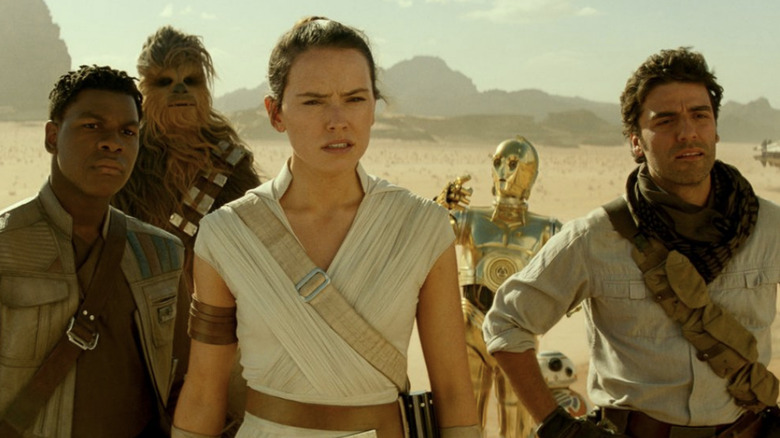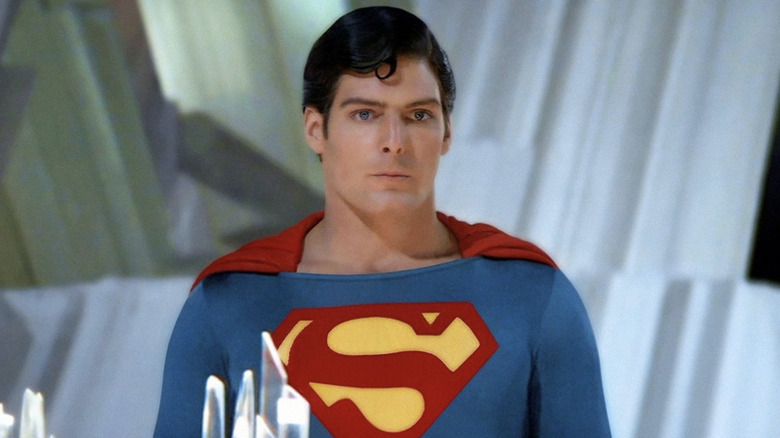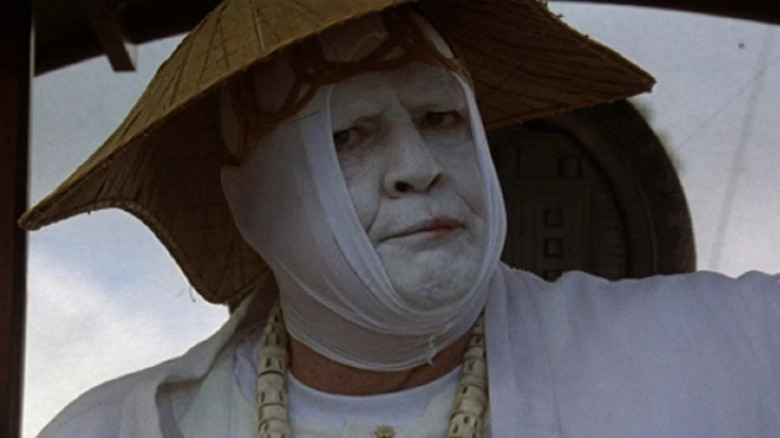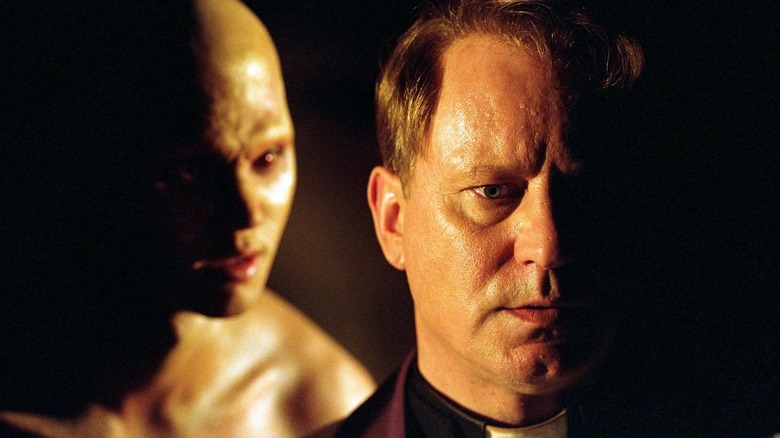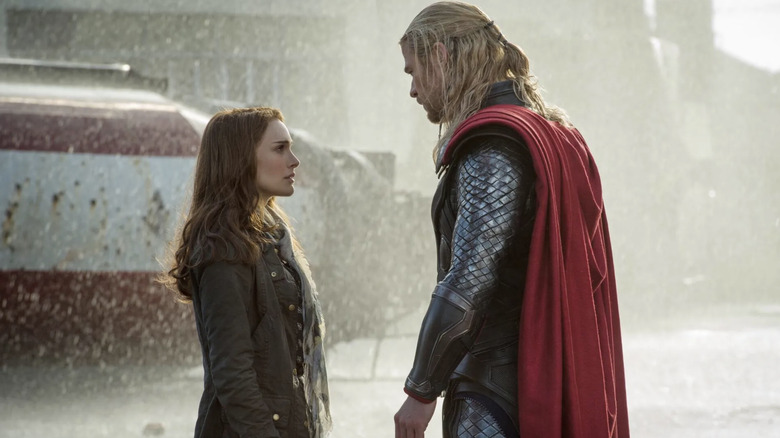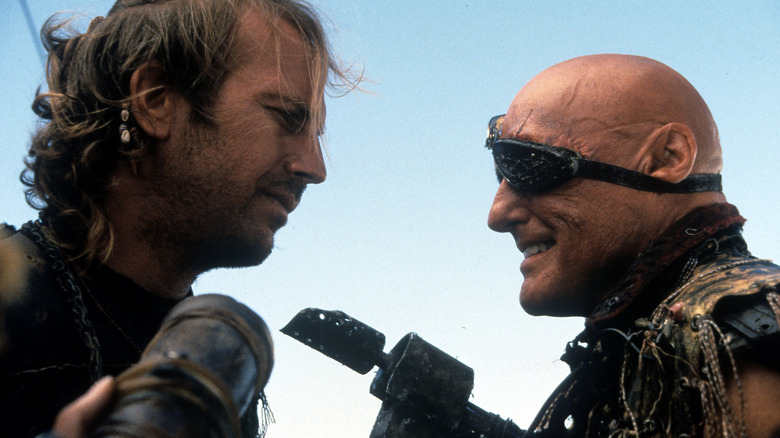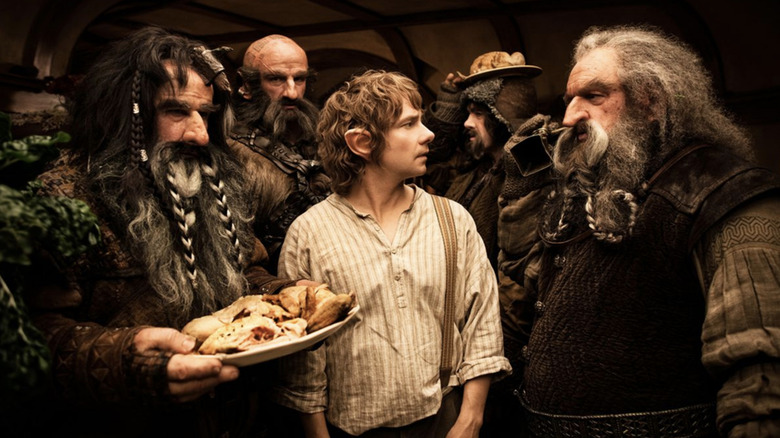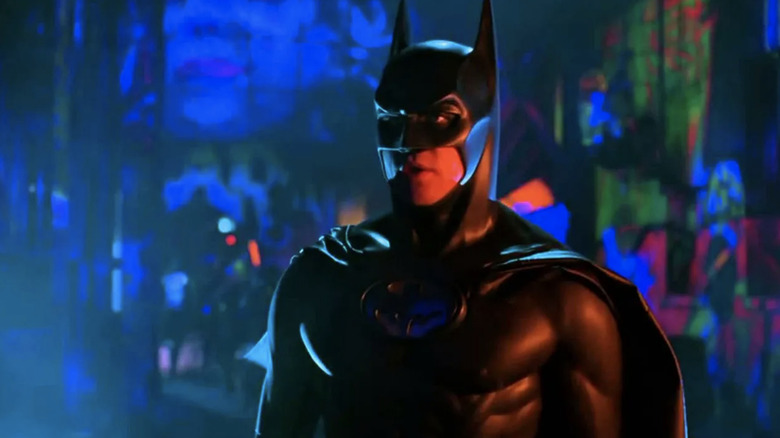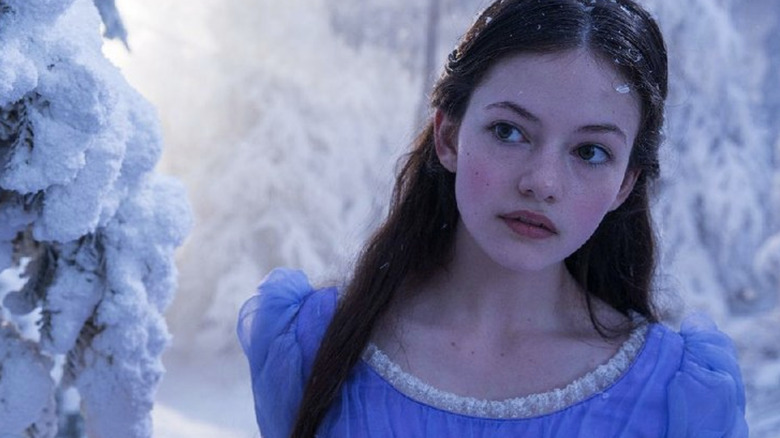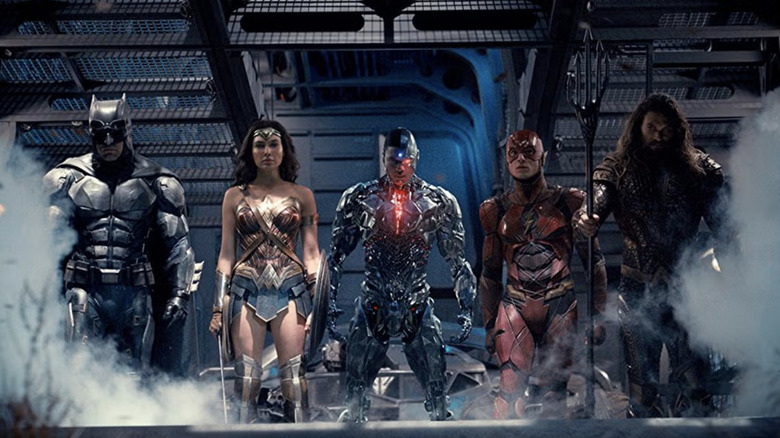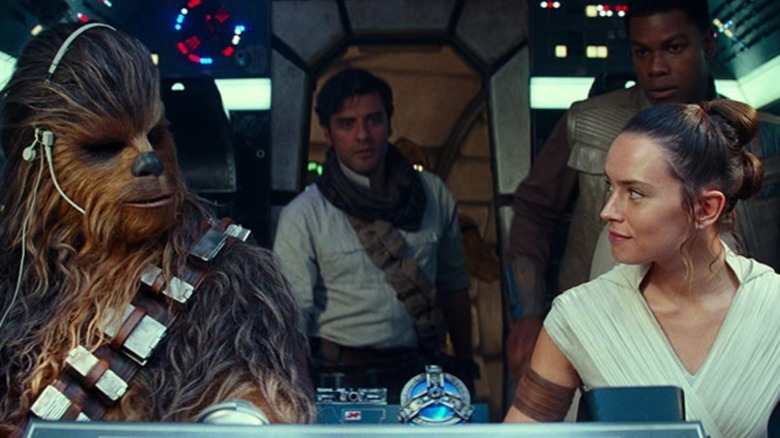10 Replacement Directors That Completely Ruined The Movie
Sometimes Hollywood drama can derail a film that might otherwise be a good time. Just like how some actor replacements can ruin a movie, so too can a switch in directors completely change the look, feel, and tone of a film. A director ought to have a complete and full vision for the project they're going to execute, and when they don't, the whole film suffers. As the proverbial "captain" of the moviemaking ship, everyone looks to the director for guidance, supervision, and general morale. While there are certainly bad directors out there, sometimes even good directors can go wrong when taking over a project from a peer.
Whether it's down to opposing visions or clashing personalities, creative ventures like filmmaking can easily go wrong when those in charge aren't on the same page. Yes, there's more often a battle between the director and the studio financing the project, but replacement directors can cause just as much harm if they're not careful. These are some examples of movies that were changed forever (and not in a good way) because directors were replaced at some point in the process. Some of the final products turned out better than others, but overall, these examples remind us of the importance of a cohesive creative vision. Ready? Action!
Richard Donner to Richard Lester on Superman II
After the incredible success that was Richard Donner's "Superman: The Movie," the cast and crew worked hard on bringing the sequel to life. Of course, "Superman" was always meant to be a two-part venture from the get-go. For the Man of Steel's blockbuster debut, Warner Bros. and producers Ilya and Alexander Salkind were hoping to make a massive two-part epic that would truly define the superhero genre. But, despite the success of the first film in 1978, the Salkinds' fired Donner during the production of "Superman II," deeming him over-budget and behind schedule. Donner had already completed a good chunk of the sequel.
In Donner's place, the Salkinds hired Richard Lester of "The Three Musketeers" fame. Lester immediately scrapped much of Donner's material and had the original script re-written, which made even Christopher Reeve a bit uneasy. Reeve still made the movie though, and Lester's campier and arguably less-sincere vision for "Superman II" came to fruition. Released in 1980, Lester's "Superman II" was a massive box-office success, but it failed to recapture the tone of the original. Naturally, the sequel's financial success led to "Superman III," though that picture is a mess of different proportions.
Unlike most movies on this list, the story of "Superman II" has a happy ending. In 2006, Warner Bros. released "Superman II: The Richard Donner Cut," which has been deemed the vastly superior version of the two. Not only does Donner's cut restore the original director's vision, but it offers audiences a more earnest look at one of the Man of Steel's greatest adventures.
Richard Stanley to John Frankenheimer on The Island of Dr. Moreau
If you've ever heard anyone talk about 1996's "The Island of Dr. Moreau," then you probably already know that the production was a train wreck. Based on the book by H.G. Wells, original director Richard Stanley spent nearly half a decade developing the picture for New Line Cinema, only to be fired after only three days on set. "New Line's point of view was, Val [Kilmer] was the money," Stanley told Entertainment Weekly after the fact, "and if it came down to being between me and Val..." Well, we know what happened.
Kilmer reportedly caused quite the uproar on set, arguing with Stanley and apparently refusing to learn his lines. New Line had enough and hired John Frankenheimer to take over — not that it halted any of the production's on-set issues. "Everybody behaved monstrously to each other," the film's screenwriter Ron Hutchinson told The Guardian in 2017, citing both Kilmer and Marlon Brando as particular problems. Frankenheimer's intense style of directing didn't go down well with the actors, who butted heads with the director throughout the production. Unfortunately, these difficulties resulted in an uneven and all-around terrible picture, alienating critics and audiences alike.
The documentary "Lost Soul: The Doomed Journey of Richard Stanley's Island of Dr. Moreau" revealed that Stanley actually found his way back to set after-all: as an extra. With the help of some of his former crew, Stanley disguised himself as one of the film's dogmen and remained on set for several days. Eventually, he and Kilmer buried the hatchet, but it was far too late to save this disaster of a motion picture.
Paul Schrader to Renny Harlin on Exorcist: The Beginning
Following "The Island of Dr. Moreau," John Frankenheimer was set to direct a prequel to "The Exorcist," but he was replaced prior to production by Paul Schrader due to health concerns. Schrader made the prequel, officially titled "Exorcist: The Beginning," his own, emphasizing the psychological aspects of Father Merrin (Stellan Skarsgård), who struggles with his faith following the Second World War. Schrader completed the film and offered studio execs not one, but two different cuts, though neither of them were up to their satisfaction. Eventually, they decided reshoots were inevitable in order to make the picture they'd hoped for.
"They were just looking to reshoot anything to make it scarier," Schrader told Bloody News (via Captain Howdy). The studio dropped Schrader entirely, replacing him with Renny Harlin, who had previously helmed the fourth "Nightmare on Elm Street" film. The script was then rewritten and it essentially became a new film, with only Skarsgård and Julian Wadham returning from Schrader's first attempt. "The first one we did was more of a psychological thriller, basically about a man in crisis," Skarsgård told the Associated Press (via Today). "For the Renny Harlin movie... I changed the performance."
In the end, "Exorcist: The Beginning" cost around $80 million, and its poor reception and lackluster box-office receipts told the studio they'd made a mistake. Schrader and "The Exorcist" author/screenwriter William Peter Blatty saw "The Beginning" together, and both were disgusted by the results. In a surprising turn of events, the failure of "The Beginning" led to Schrader getting the chance to revisit the prequel, which was released by Warner Bros. in a limited capacity under the title "Dominion: Prequel to The Exorcist." Blatty himself called it a "classy, elegant piece of work" (via Houston Chronicle).
Petty Jenkins to Alan Taylor on Thor: The Dark World
Did you know that "Wonder Woman" director Patty Jenkins nearly made a Marvel Cinematic Universe movie? She was hired for "Thor: The Dark World," but Jenkins left the project before production even began, with the age-old excuse of "creative differences" being the official reason. "I pitched them that I wanted to do 'Romeo and Juliet,'" Jenkins told BuzzFeed after the fact. "I wanted Jane to be stuck on Earth and Thor to be stuck where he is. And Thor to be forbidden to come and save Jane because Earth doesn't matter."
Natalie Portman was reportedly furious when she found out that Jenkins had been given the boot, since she herself had pushed Jenkins into the running. Soon after, the studio found its new director in "Game of Thrones" helmer Alan Taylor, and the results were, well, uninspired. Though "The Dark World" did well enough at the box-office, it's considered to be the worst "Thor" film and one of the poorest MCU movies in general.
Jenkins has since spilled the beans on her departure from the film. "I did not believe that I could make a good movie out of the script that they were planning on doing," she told Vanity Fair in 2020. "It would have looked like it was my fault." It all worked out for Jenkins in the end though, as she ended up directing two "Wonder Woman" flicks for DC instead. Taylor, on the other hand, went on to make "Terminator Genisys," which was even more misguided than his "Thor" sequel.
Kevin Reynolds to Kevin Costner on Waterworld
Okay, so Kevin Costner has never been officially credited as the director of "Waterworld," but he was the one who oversaw the picture once director Kevin Reynolds bowed out. The pair had worked together previously on "Fandango" and "Robin Hood: Prince of Thieves," but a feud between Costner and Reynolds erupted when they took on this post-apocalyptic epic. Today, "Waterworld" is best known as a stunt show at Universal Studios, but back in the mid-1990s, folks knew it as the Costner picture that ran well over budget and dropped to lukewarm reviews.
In an interview with The Sunday Times, Reynolds stated that Costner was constantly meddling in his professional business, seemingly unable to relinquish any control of the project. Reynolds ultimately walked away, leaving "Waterworld" behind. "Now Kevin gets to work with his favorite actor and director," Reynolds said. Ironically, Costner himself had initially campaigned on Reynolds' behalf for him to helm the picture. "In the future, Costner should only appear in pictures he directs himself," the director later said (via Esquire).
Despite Costner's intentions, "Waterworld" arrived dead in the water. This feud (along with a hellish production complete with set-destroying natural disasters) likely contributed to the film's demise, making us wonder what this ambitious project could have been had Reynolds managed to keep creative control. Interestingly enough, Reynolds retains sole directorial credit despite "Waterworld" being the Kevin Costner show all the way.
Guillermo del Toro to Peter Jackson on The Hobbit
We all know that Peter Jackson's "The Lord of the Rings" trilogy is something special, but fans have had very mixed reactions concerning the director's "The Hobbit" prequels, and for good reason. Originally, "The Hobbit" was meant to be a two-part adaptation of the J.R.R. Tolkien story, directed by none other than Guillermo del Toro. In the long list of unrealized del Toro projects, "The Hobbit" is by far the biggest tragedy. Paired with Jackson, Fran Walsh, and Philippa Boyens, del Toro and his team got cracking on scripting the project, with the director hoping to find the right blend between Jackson's vision for Middle-earth and his own.
Sadly, del Toro and Middle-earth just weren't meant to be. Due to a number of production delays, Guillermo del Toro eventually left "The Hobbit." As a result, Peter Jackson undertook the project himself, expanding it from two films to a trilogy. This bloated attempt at expanding Tolkien's novel resulted in some questionable creative choices on Jackson's part, with the third film — "The Hobbit: The Battle of Five Armies" — essentially becoming a two and a half hour battle sequence.
According to some people who worked on the movies, the rushed production schedule quickly became an issue. Jackson himself admits that he "just started shooting the movie without most of it prepped at all" (via the Independent). Though del Toro still received a screenwriting credit on all three pictures, his decision not to direct haunted him. "I have huge heartbreak," the filmmaker explained in 2010 (via The Hollywood Reporter). "A piece of me has been dented forever."
Tim Burton to Joel Schumacher on Batman Forever
When Tim Burton's "Batman" hit theaters in 1989, audiences were blown away by the dark, gothic take on the famous DC superhero. But when his sequel, "Batman Returns," came out, not everyone (least of all the studio) was happy with the results. In the end, Warner Bros. pushed Burton out. "I remember toying with the idea of doing another one," the director explained in the documentary "Shadows of the Bat: The Cinematic Saga of the Dark Knight," though he could tell that execs weren't keen on him helming the next entry. At the time, a production insider told Entertainment Weekly that the studio was put off by the tone of "Batman Returns," adding, "Warner Bros. didn't want Tim to direct. He's too dark and odd for them."
In the end, the studio went with "The Lost Boys" director Joel Schumacher, who had a starkly different idea about what Batman should be. Replacing Michael Keaton with Val Kilmer, Schumacher made "Batman Forever," which stripped the Dark Knight of Burton's dark and creepy tone, replacing it instead with a Gotham City that looked like it was stuck in a perpetual rave. Though Warner Bros. succeeded in making Batman more "family friendly" (sort of), the 1995 film veered back into the campiness of the '60s television series, which Burton fought so hard to divorce the character from.
What could have been Burton's natural continuation from "Batman Returns" ended up as a two-hour advertisement for Batman and Robin action figures. Even animated movies made for younger audiences, like 1993's "Batman: Mask of the Phantasm," had more substance to them than "Forever." Schumacher's sequel, the much-maligned "Batman & Robin," fared far worse. The story of Tim Burton's proposed third "Batman" movie is an interesting one, it's just a shame we never got to see it.
Lasse Hallström to Joe Johnston on The Nutcracker and the Four Realms
If you don't remember "The Nutcracker and the Four Realms," that's okay, Disney doesn't seem to either — and maybe that's for the best. Hoping to adapt E.T.A. Hoffmann's traditional "Nutcracker" story in the same vein as Tim Burton's "Alice in Wonderland," director Lasse Hallström shot the film for four months in the United Kingdom. Just under a year after production wrapped, Disney announced that "The Nutcracker" was in dire need of reshoots, with Joe Johnston ("Captain America: The First Avenger") set to replace Hallström as the director.
"The film is in very good hands in London while I'm away," Hallström told The Hollywood Reporter. "I will return to postproduction after the holidays." Johnston's reshoots lasted just over a month, but it's unclear exactly what changed in the interim. Evidently, the replacement director reworked enough of Hallström's material that the pair agreed on sharing directorial credit for the finished film. But "The Nutcracker and the Four Realms" proves that, sometimes, two heads are not better than one.
The results speak for themselves, as "The Nutcracker" left the House of Mouse out of pocket for around $65 million. We don't know if Hallström or Johnston is at greater fault here, but the final product was slow, derivative, and failed to capture the imagination of audiences. "The Nutcracker and the Four Realms" is ultimately a very forgettable film, which is a real shame given the unique source material.
Zack Snyder to Joss Whedon on Justice League
Perhaps the biggest ever example of a director replacement sending a movie totally off the rails, Marvel Cinematic Universe director Joss Whedon coming in for Zack Snyder on DC's "Justice League" is a well-known story at this point. After the death of his daughter, Snyder wasn't in a position to get the big team-up movie over the line, despite having completed production. While working on the film, Whedon deemed Snyder's material incomplete and extensive reshoots were ordered. Whedon's rewrites combined with his contrasting vision (he even replaced Tom Holkenborg's score with Danny Elfman's) turned "Justice League" into a carbon copy of 2012's "Avengers." Things were made worse when actors Ray Fisher and Gal Gadot accused Whedon of unprofessional on-set behavior.
"Justice League" was released in 2017 to mixed reviews. Some claimed it was the right direction for the DC Extended Universe following "Batman v Superman." Others criticized Whedon's clear Marvelization of the final product (on which Snyder still retained sole directorial credit, with Whedon given a co-writer role). Understandably, fans were outraged, and for years campaigned for a "Snyder cut" of "Justice League." During the COVID-19 pandemic, Warner Bros. finally caved, and Snyder was given an estimated $70 million to finish his four-hour director's cut, released in 2021 as "Zack Snyder's Justice League" on Max.
The difference between the two films is undeniable. Snyder's vision is bold and clear, giving every character a full arc and further embellishing his universe. "This return to that pedigree and to let my singular vision of my movie be realized, in this format, in this length, is unprecedented and a brave move," Snyder told The Hollywood Reporter. Indeed, "Justice League" was effectively ruined by Joss Whedon's interference, but the "Snydercut" is better in every way.
Colin Trevorrow to J.J. Abrams on Star Wars: The Rise of Skywalker
Of all the movies that never happened, Colin Trevorrow's "Star Wars: Duel of the Fates" is among the ones we want to see the most. His proposed version of "Episode IX" would have made Finn (John Boyega) something of a legend within the First Order, seen Rey (Daisy Ridley) embrace both the Light and Dark Sides of the Force, and, perhaps most notably, there was absolutely no Emperor Palpatine (Ian McDiarmid) in sight. But the "Jurassic World" director was removed from "Episode IX" over "creative differences" as he and Lucasfilm president Kathleen Kennedy couldn't come to an agreement.
J.J. Abrams, who had previously directed "Star Wars: The Force Awakens," was brought back for the ninth picture. Scrapping Trevorrow's plans entirely, Abrams went the safe route. This was likely a reaction to audiences not getting on board with Rian Johnson's "Star Wars: The Last Jedi," which did well with critics but was largely trashed by fans. Rey was turned into the daughter of Palpatine (who had somehow returned), characters were constantly being "killed" in fake-out deaths, Finn and Poe (Oscar Isaac) were essentially sidelined, and, well, you know the rest.
In the end, 2019's "Star Wars: The Rise of Skywalker" was a massive misfire, and Abrams was at the dead center of it. The powers that be haven't released a "Star Wars" film on the big screen since, instead focusing on the streaming world, where they've had a lot more success in recent years. You can check out Looper's ranking of every "Star Wars" TV show right here.
